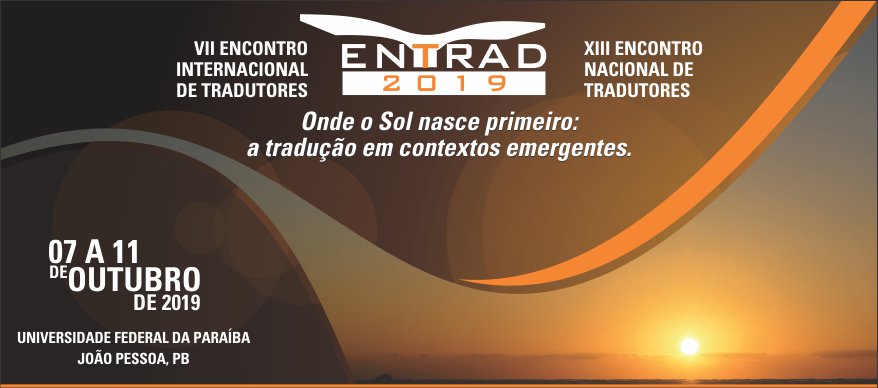Antes de se inscrever, leia as orientações AQUI
Receitas de tradução culinária: relatos e reflexões
Cooking Translation Recipes: experiences and observations
Stella Esther Ortweiler Tagnin
USP
seotagni@usp.br
http://lattes.cnpq.br/4402771732265181
Elisa Duarte Teixeira
UnB
elisadut.unb@gmail.com
http://lattes.cnpq.br/2718046708360707
Rozane Rodrigues Rebechi
UFRGS
rozanereb@gmail.com
http://lattes.cnpq.br/5282233717710567
Idiomas de trabalho | Work languages: Português, English
Resumo: A culinária “globalizada”, associando técnicas da cozinha profissional a saberes ancestrais da culinária caseira, vem ganhando cada vez mais espaço no mundo atual. Isso pode ser comprovado pela quantidade crescente de materiais audiovisuais dedicados ao tema disponíveis tanto na mídia impressa quanto digital – dos belíssimos livros de culinária importados ou nacionais que vemos nas livrarias a uma infinidade de blogs, canais eletrônicos e sites especializados dedicados ao tema, além de rótulos de produtos importados e as regulamentações que regem sua redação, para citar apenas alguns. A internacionalização de ingredientes e saberes culinários, aliada à rapidez e à facilidade de transmissão de informações do mundo digital permitem que alimentos, assim como as receitas e palavras com as quais harmonizam, ‘viajem’ de um lugar para outro (GERHARDT, 2013). E para que essa viagem se realize sem grandes percalços, uma tradução adequada é necessária. Contudo, não raro deparamos com textos culinários traduzidos que são pouco convencionais, contêm rendições literais de idiomatismos e/ou adaptações que acarretam a descaracterização de referências culturais, além de outros erros de interpretação e terminológicos com consequências indesejáveis (REBECHI, 2016). A falta de materiais de consulta disponíveis, ou de conhecimento das culturas envolvidas, seja a de partida ou de chegada, bem como a inexistência de treinamento formal para os tradutores da área são alguns dos fatores que podem justificar esses problemas. Apesar de o texto culinário – tradicionalmente associado ao universo feminino – ter sido, por muito tempo, considerado inferior, na comparação com a literatura e com outras artes (CAPATTI & MONTANARI, 1999), e de sua tradução ter sido desprezada como área técnica no Brasil até bem recentemente (TEIXEIRA, 2014; 2008), a popularização do tema tem motivado diversas pesquisas acadêmicas. Elas se debruçam sobre os aspectos culturais, linguísticos, terminológicos e tradutórios da culinária, como pode ser comprovado, por exemplo, pela criação de eventos internacionais – como as duas edições de Food and Culture in Translation (FACT 2014 e 2016) – e publicações resultantes de pesquisas acadêmicas, tais como The Culinary Linguistics: the chef’s special (GERHARDT et al., 2013) e The Language of Food: a linguist reads the menu (JURAFSKY, 2014). Com base nos fundamentos teóricos e metodológicos da Linguística de Corpus, associados a várias teorias linguísticas, tradutórias e terminológicas, este simpósio pretende discutir os desafios envolvidos na tradução de quaisquer gêneros e tipologias textuais que pertençam a ou abordem a culinária, a gastronomia ou a alimentação em geral do ponto de vista de sua expressão linguística oral, escrita ou audiovisual. Os resumos poderão ser submetidos em português ou inglês, e deverão ser apresentados no mesmo idioma.
Palavras-chave: Tradução especializada, Culinária, Linguística de Corpus
Abstract: Combining professional cooking techniques to the ancient wisdom of home cooking, “global” cuisine has been taking more and more space in our society nowadays. This can be observed in the great number of audiovisual materials on the subject available both in printed and digital media – from the lavishly illustrated cookbooks we see in bookstores to the myriad of magazines, blogs, TV and internet channels, and websites dedicated to cooking in several languages. Not to mention the labels of imported products and all the legislation necessary to sell food outside one’s country, to mention just a few. The internationalization of cooking ingredients and expertise, together with the ease of dispersing information in the digital era allow food, as well as the words and recipes with which they pair with, to “travel” from place to place (GERHARDT, 2013). For this journey to run smoothly, an adequate translation is needed. Nevertheless, we are often faced with cooking texts that do not sound natural. They sometimes have literal renditions of idiomatic expressions, adaptations which distort cultural references, or even interpretation and terminological inaccuracies which may have undesirable consequences (REBECHI, 2016). The fact that reference materials on cooking are not easily available, and that translator may not be acquainted with source and target cultures – due to a lacking in training specifically to translate, for example – are some of the factors that may explain the problem. Even though cooking texts – traditionally associated with the feminine world – have long been considered minor in comparison to literature and other arts (CAPATTI & MONTANARI, 1999), and that translation of cooking texts has been neglected as a technical area until very recently (TEIXEIRA 2014; 2008), the popularization of the theme has motivated several academic researches. They focus on cultural, linguistic, terminological and translational aspects of cooking, as can be attested, for example, by the creation of international events – such as the two editions of Food and Culture in Translation (FACT 2014 and 2016) – and publications based on academic work, such as The Culinary Linguistics: the Chef’s Special (GERHARDT et al., 2013) and The Language of Food: a Linguist Reads the Menu (JURAFSKY, 2014). Departing from Corpus Linguistics as a methodological and theoretic approach, the aim of this symposium is to discuss the challenges posed by translating any genres and textual typologies encompassed by or approaching cooking, the culinary arts, gastronomy or food in general, from the point of view of their oral, written or audiovisual linguistic expression. Abstracts can be submitted in Portuguese or English and presented in the same language.
Keywords: Specialized translation, Cooking, Corpus linguistics
Antes de se inscrever, leia as orientações AQUI
